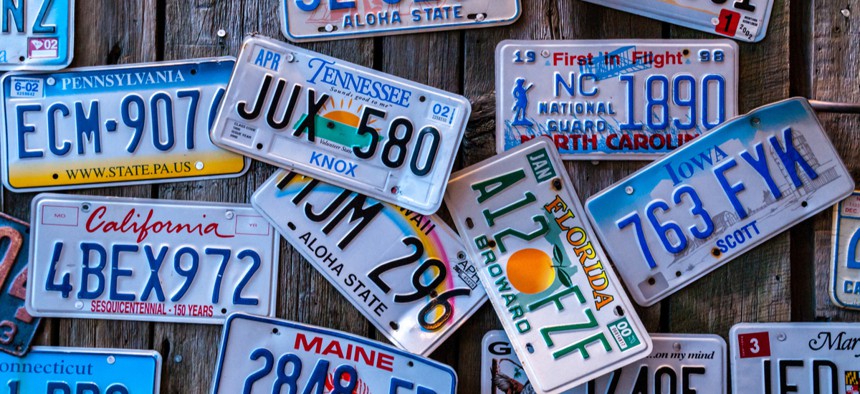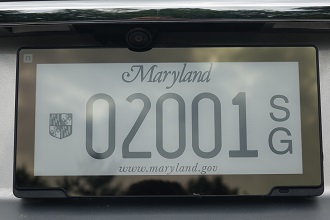States Move Ahead With Digital License Plates

Leene/Shutterstock.com
Maryland is the latest state to launch a pilot program to test the technology for consumer use.
Some state vehicles in Maryland will be outfitted with digital license plates as part of a two-year pilot program to see if the developing technology could work for customers.
The devices come with a built-in LTE connection that can allow for payment of tolls and parking fees, display of amber alerts and safety information, and automatic registration renewal that eliminates the need for a plate sticker and a trip to the DMV. The plates can also alert law enforcement if a car is reported stolen.
“We are constantly evaluating emerging technologies in the transportation industry to find innovative ideas that could benefit our customers,” Chrissy Nizer, administrator of the Maryland Department of Transportation Motor Vehicle Administration, said in a statement. “We are excited about the digital plate pilot and the potential of this technology to pave the way for additional customer convenience.”
The test program, a partnership with digital license plate manufacturer Reviver, will provide the digital plates to 20 MVA fleet vehicles and two Maryland Transportation Authority vehicles. The devices, provided to the state for free, are the same size as traditional license plates but have a digital display that uses the same technology as Amazon’s popular Kindle e-readers.

Digital license plates aren’t yet legal in Maryland. Motorists in California and Arizona can use them in place of traditional plates, though the technology has not thus far been widely popular.
Roughly 1,400 out of 25 million registered cars in California have the plates, according to data from the state Department of Motor Vehicles. Drivers that opt for the digital plates can only install them on the rear of the car, with a traditional plate required for the front. Digital plates have been legal for drivers in Arizona since January, but a spokesman for the state’s Department of Transportation told the Frederick News Post he was unaware of any in use in the state.
Cost may be a factor. The “Essential” model of Reviver’s digital plate, with an LTE connection and automatic renewal capabilities, sells for $349, with an installation fee of $199 and a monthly data charge of $2.99. The “Pro” model, with additional features like GPS tracking and geofencing alerts, retails for $499.99, plus a $199 installation fee and a monthly data charge of $6.99.
The capability of the technology to collect location data has also sparked privacy concerns for some organizations, including the Electronic Frontier Foundation, a San Francisco-based nonprofit that “defends civil liberties in the digital world.”
“Your locational history has the potential to reveal a lot more than … where you happen to be at a particular moment in time,” Stephanie Lacambra, a criminal defense attorney for the organization, told the San Francisco Chronicle. “It can reveal your associations, who you speak with, where you go to work, where you live.”
Reviver has said it does not share data with third parties, including law enforcement and state agencies, unless mandated by court order, and that the data does not automatically update to the cloud. Users have the option to turn off their location settings.
“We are very pleased to work with the Maryland Motor Vehicle Administration to help make Maryland one of the first states in the Northeast to pilot digital license plates, highlighting Maryland’s progressive approach to simplifying the registration process,” Neville Boston, Reviver’s co-founder and CEO, said in a statement. “We look forward to partnering with the state to leverage the vast potential digital license plates offer for future innovation.”
NEXT STORY: A Robot Has Been Stuck on Mars for Months





